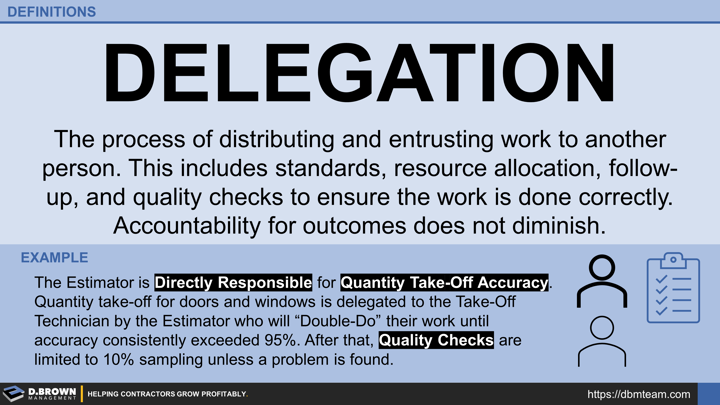Delegation is how you scale productivity through all levels of a construction business.
EXAMPLE
The Estimator is Directly Responsible for Quantity Take-Off Accuracy. Quantity take-off for doors and windows is delegated to the Take-Off Technician by the Estimator who will “Double-Do” their work until accuracy consistently exceeds 95%. After that, Quality Checks are limited to 10% sampling unless a problem is found.
Delegation is not the same as decentralization, which is about how you scale entrepreneurialism in the business which occurs at much later stages of growth, typically 5-6+ with some possible experiments.
Delegation without effective standards, training, resource allocation, follow-up, and checks for quality control (right outcomes) and quality assurance (right process) isn't delegation - it is the abdication of a manager's responsibilities.
Hyman G. Rickover was the longest serving Admiral in the US Navy and is considered the "Father of the Nuclear Navy" moving from the first nuclear bomb test in July 1945 to a nuclear-powered submarine launched in January 1954. For a new and extremely dangerous technology, there has never been a nuclear incident on a US submarine or ship. A sailor on a nuclear submarine has less radiation exposure than what a sailor on a ship gets just from natural sunlight.
Hyman G. Rickover was both a great engineer and a great manager - a few words of wisdom about responsibility, delegation, and attention to details.
“Responsibility is a unique concept... You may share it with others, but your portion is not diminished. You may delegate it, but it is still with you... If responsibility is rightfully yours, no evasion, or ignorance or passing the blame can shift the burden to someone else. Unless you can point your finger at the person who is responsible when something goes wrong, then you have never had anyone really responsible.”
"The person in charge must concern themselves with details. If they do not consider them important, neither will their subordinates. Yet “the devil is in the details.” It is hard and monotonous to pay attention to seemingly minor matters. In my work, I probably spend about ninety-nine percent of my time on what others may call petty details. Most managers would rather focus on lofty policy matters. But when the details are ignored, the project fails. No infusion of policy or lofty ideals can then correct the situation."
See full speech delivered to Columbia University in 1982.
See Responsibility Assignment Matrix (RAM) and Organizational Development.

